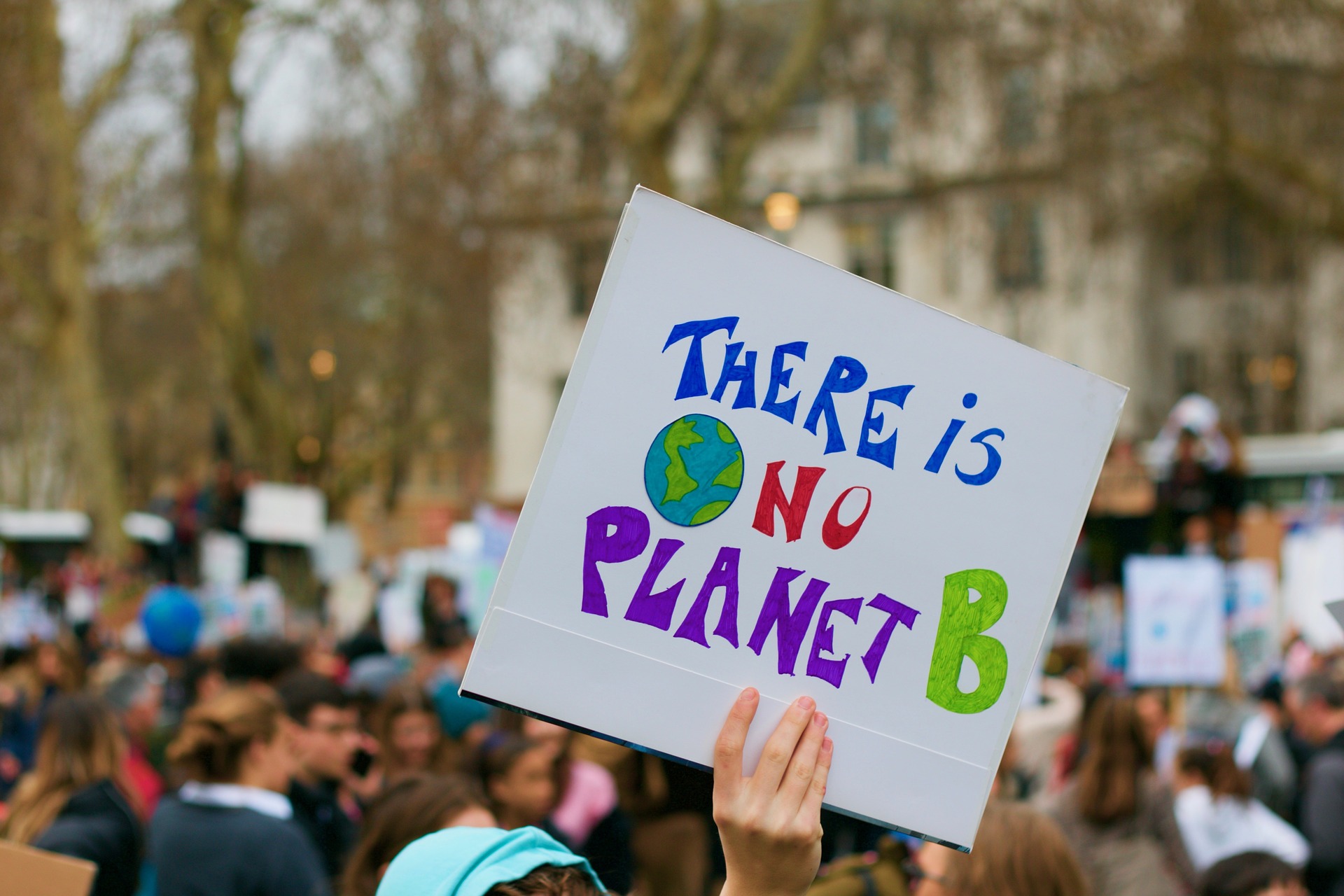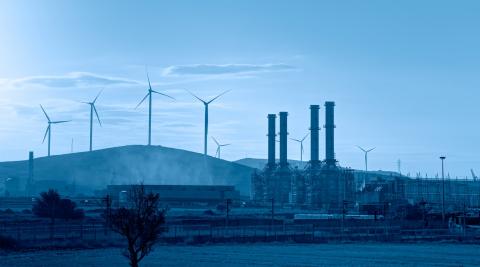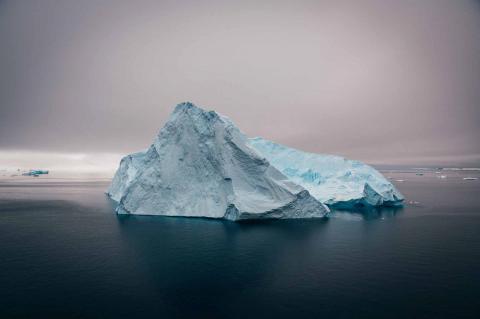1. What exactly is the phenomenon and by which physical mechanism does it occur?
The Ministry for Ecological Transition’s website offers this guide, published in 2005, to explain why the planet’s climate is changing: “Levels of carbon dioxide (CO2) and other greenhouse gases in the atmosphere have increased dramatically during the industrial era due to human activities such as deforestation and heavy consumption of fossil fuels, stimulated by economic and population growth.”
Greenhouse gases, like a blanket wrapped around the planet, trap heat energy in the lower layer of the earth’s atmosphere. If levels rise too high, the resulting global increase in air temperature —global warming— could disrupt natural climate patterns.
In its Third Assessment Report, in 2001, the Intergovernmental Panel on Climate Change (IPCC) already noted that “there is new and stronger evidence that most of the warming observed over the past 50 years is attributable to human activities”.
2. Climate change, climate crisis or global warming?
As the Fundación del Español Urgente explains, “global warming” is the increase in the Earth’s temperature, while “climate change” is a broader term that includes all variations in climate. The term “climate crisis” is preferred by many, to highlight the magnitude of the changes and the need for urgent action to mitigate them.
3. We are officially facing a “climate emergency”
In November 2019, prior to the COP 25 climate summit in Madrid in December 2019, the European Parliament issued a declaration with symbolic value stating that in Europe and around the world we are experiencing a “climate and environmental emergency”.
Shortly afterwards, in January 2020, the Spanish Council of Ministers also approved the agreement on the Declaration on the Climate and Environmental Emergency in Spain, in which it committed to adopting 30 priority lines of action, five of them in the first 100 days, to combat climate change with cross-cutting policies.
4. Some milestones in the awareness of and fight against climate change:
The IPCC itself provides the following summary:
In 1990, the IPCC’s First Assessment Report (FAR) underlined the importance of climate change as a global challenge requiring international cooperation. This report was instrumental in the creation of the United Nations Framework Convention on Climate Change (UNFCCC), the international treaty to reduce global warming and address the consequences of climate change.
This agreement was adopted in New York in 1992 and entered into force in 1994. The 197 countries that have ratified it are called “parties"” They meet periodically at COPs (Conference of the Parties, usually called ‘climate summits’). There have been 26 COPs so far, the last one in November 2021 in Glasgow, Scotland.
The Second Assessment Report (1995) laid the groundwork for the adoption of the Kyoto Protocol in 1997. The Third Assessment Report (2001) focused attention on the impacts of climate change and the need for adaptation. The Fourth Assessment Report (2007) laid the groundwork for a post-Kyoto agreement, focusing on limiting warming to 2 °C. The Fifth Assessment Report was completed between 2013 and 2014. It provided scientific input for the Paris Agreement. The IPCC is currently (as of March 2022) in its sixth assessment cycle.
5. What are the objectives of the latest climate agreement, and are we close to achieving them?
The Paris Agreement is a legally binding international climate change treaty adopted by 196 Parties at COP21 in Paris in 2015. It entered into force in 2016. It aims to limit global warming to well below 2°C, preferably 1.5°C, compared to pre-industrial levels.
The latest study of the IPCC Working Group I (August 2021) states: “Unless there are immediate, rapid and large-scale reductions in greenhouse gas emissions, limiting warming to 1.5°C will be beyond reach”.
6. What was the last climate summit and what conclusions were reached? [as of March 2022]
The latest last climate summit was COP 26, held in Glasgow (Scotland) in November 2021. Its main conclusions are summarised in this press release. In the final declaration, according to the note, “countries called for enhanced mitigation action in the current key decade, as achieving the [maximum pre-industrial temperature increase] 1.5 degrees target will require a 45% reduction in CO2 emissions by 2030 (compared to 2010)”.
This is the EU’s position at COP 26 in Glasgow.
7. What is the IPCC and why is it so important?
The IPCC (Intergovernmental Panel on Climate Change) is the United Nations body that assesses scientific knowledge on climate change. It was established in 1988 and has 195 Member States. Its reports are written by thousands of scientists from around the world who assess the many studies published each year, and thus represent the consensus of the international scientific community.
The IPCC comprises Working Group I, que which deals with the physical basis of climate change; Working Group II, on impacts, adaptation and vulnerability; and Working Group III, on mitigation of climate change.
The IPCC has so far issued five reports. In 2022 it will publish its sixth report, integrating the contributions of Working Groups I, II and III.
8. The IPCC is about to publish its Sixth Synthesis Report, which integrates the findings of its three working groups. What were the main findings in the last full report, of the five published so far? [as of March 2022]?
The IPCC's fifth report, finalised between 2013 and 2014, concluded:
- the human influence on the climate system is clear;
- the more we disrupt the climate, the greater the risks of severe, widespread and irreversible impacts;
- we have the means to limit climate change and build a more prosperous and sustainable future.
9. What is the latest that the IPCC working groups have published [as of March 2022]?
The latest Working Group II (Impacts) study was published on 28 February 2022. It is part of the sixth report, which will be published in 2022. The press release of this latest study stated: “Human-induced climate change is causing dangerous and widespread disruption to nature and is affecting the lives of billions of people around the world, despite efforts to reduce the risks”.
“The increase in heat waves, droughts and floods is already exceeding the tolerance thresholds of plants and animals, causing mass mortality of various species, such as trees and corals,” the Group II study continued. “Extreme events have exposed millions of people to severe food and water insecurity, especially in Africa, Asia, Central and South America, small islands and the Arctic.”
In August 2021, IPCC Panel I (science basis) published its latest work. Its press release stated: “Many of the changes observed in the climate are unprecedented in thousands, if not hundreds of thousands of years, and some of the changes already set in motion—such as continued sea level rise—are irreversible over hundreds to thousands of years.”
10. How much has the global temperature of the planet already risen and how much is it expected to rise in the short term?
IPCC Panel I (science basis) published its latest work in August 2021. It concluded that greenhouse gas emissions from human activities are responsible for a warming of about 1.1°C since 1850-1900. Warming at the Earth’s surface is higher than the global average. In the Arctic, warming is more than double.
The global average temperature over the next 20 years is expected to reach or exceed 1.5°C warming.
11. Why is the scientific community so sure that climate change is due to human action, when there have been ice ages and other extreme climate changes in the planet’s history?
Mainly because of the speed and global nature of the changes. The IPCC answers these questions and many others in the list of frequently asked questions in the latest Working Group I study.
This document states: “It is indisputable that human activities are causing climate change, making extreme weather events, such as heat waves, heavy rainfall and droughts, more frequent and severe.”
12. Was the Filomena storm due to climate change, and what about the heatwaves in Canada and the floods in Germany?
No single phenomenon can, in isolation, be attributed to climate change. But it can be argued that storms such as Philomena and other recent climate events such as heat waves and floods are increasing in frequency in a manner consistent with the expected consequences of the climate crisis.
The IPCC Special Report on the impacts of global warming of 1.5°C above pre-industrial levels considers extreme weather events such as “heat waves, heavy precipitation, drought and concurrent wildfires and coastal flooding” as a major concern that imply “risks or impacts to human health, livelihoods, property and ecosystem”.
13. What other changes have already been detected in addition to temperature?
As explained in the latest IPCC Group I study, which deals with the science of climate change, global changes are observed in humidity and dryness, winds, snow and ice, coastal zones and oceans.
Its press release summarizes: more intense rainfall and drought and more flooding; continued sea level rise throughout the 21st century. “Extreme sea level events that once occurred once every 100 years could become annual by the end of this century”; thawing permafrost; loss of seasonal snow; melting glaciers; loss of Arctic Sea ice in summer; warming and acidification of the ocean. Especially in cities, more heat waves and flooding.
14. Are these changes irreversible?
Hoesung Lee, chair of the IPCC, stated in the latest Working Group II study on climate change impacts (February 2022): “This report is a dire warning about the consequences of inaction (...) climate change is a grave and mounting threat to our well-being (...). The world faces unavoidable multiple climate hazards over the next two decades with global warming of 1.5°C (2.7°F). Even temporarily exceeding this warming level will result in additional severe impacts, some of which will be irreversible.”
15. Is it already known what changes will occur in each region of the globe?
The Sixth Assessment Report provides for the first time a more detailed analysis of climate change at the regional level, as well as a model that translates physical changes in climate into implications for society and ecosystems. This regional information is available in detail in an Interactive Atlas, as well as in the Regional Fact Sheets, the Technical Summary, and the Baseline Report.
16. Is there still time to stop climate change? How?
The latest Working Group I study (on climate science) states: “There’s no going back from some changes in the climate system. However, some changes could be slowed and others could be stopped by limiting warming. To limit global warming, strong, rapid and sustained reduction in CO2, methane and other greenhouse gases are necessary. This would not only reduce the consequences of climate change but also improve air quality.”
17. How are greenhouse gas emissions doing?
As explained on the UN climate reporting website, “greenhouse gas concentrations are at their highest level in 2 million years. And emissions continue to rise. As a result, the Earth is now about 1.1°C warmer than it was in the late 1800s. The last decade (2011-2020) was the warmest on record”.
Emissions trends are reported on this page.
18. Which countries emit the most?
According to the United Nations, China, the United States and the European Union emit 46% of global emissions. Together they contribute 16 times more emissions than the last 100 countries.
Information milestones foreseen as of March 2022
On 4 April 2022, the approval of the IPCC Working Group III report will be announced at a press conference, following a detailed review in the preceding days. Media accreditation information is here.
In 2023, the first global stocktaking of the United Nations Framework Convention on Climate Change (UNFCCC) is due to take place. At that time, countries will review progress towards their goal of keeping global warming well below 2°C “while, at the same time, continuing efforts to limit the temperature increase to 1.5°C,” the IPCC website explains.
More information
Official information in Spain: Plans and strategies of the Ministry for Ecological Transition.
United Nations information in Spanish
Website of the European Commission on the actions for combatting climate change in the European Union, DG CLIMA (Directorate General for Climate Action).
News of the DG CLIMA (European Directorate General for Climate Action).
Website of the European Parliament on European actions taken against climate change.




